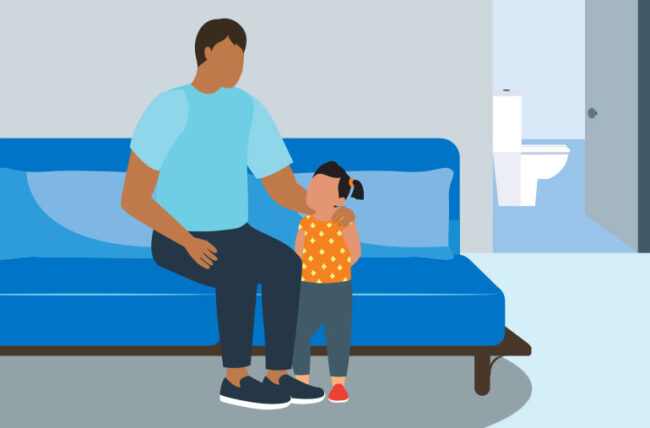You thought that your child was trained. Now the laundry piles up as they are constantly needing to change their pants. You’re wondering why there are so many accidents.
Potty-training regressions are unfortunately quite common. They can frustrate both parents and children.
As a parent, potty training regressions can be a real challenge, says Noah Schwartz MD. It’s not uncommon for children to experience accidents or regressions. How parents deal with them can determine how long the regressions last.
We spoke with Dr. Schwartz to find out why children regress, and what you can help them do in order to get back on track.
Regressions and accidents
A short-lived, occasional streak of accidents, such as your child urinating a few time one week but not the next, is not the same thing as a regression in potty training. It’s not a regression if your child is too busy swinging on the playground to make it inside before the time limit. This kind of random failure to potty is not unusual. Accidents will happen. Dr. Schwartz explains that if your child is potty trained and misses the bathroom once or twice it’s no reason to panic.
Try to be patient. He recommends waiting a few days to see if the child is having accidents regularly. If they are having accidents more than once a day or only at school or if there is a pattern that shows that accidents have become more frequent, then we may be talking about regression.
In other words, a regression is more than just a single incident. Potty training may not be the only skill your child will regress on.
“We call it regression when we see a child who has reached a developmental milestone, but then does not reach that goal any longer,” Dr. Schwartz says. We see this in many areas of child growth, including conversational skills, large-motor skills, and more. Children are trying to do and learn a lot at once. Sometimes they fall behind.
Why are kids having potty training regressions?
Your child is an individual — and often baffling — person. Their reasons for “forgetting to use the toilet consistently” could be anything. If you have ever thought about the reasons behind your quirky habits, you will probably also find that you are not rational. It’s part of being a human.
Dr. Schwartz believes that potty training regressions are usually caused by four major causes.
Psychosocial factors
Potty training regression is most often caused by stress. The things that cause stress or anxiety in children may not be apparent to adults.
When things in the world change, kids can experience high levels of anxiety and stress. This can include:
- New daycare facility.
- Moving into a new home.
- Changes in the family dynamic, such as a divorce or new baby.
As your child has to deal with new fears and expectations, it can distract them from their goal of staying dry. This is a good time to have a potty training regression.
Dr. Schwartz says that “anything new, perceived as new, different or stressful to a child could cause a regression.” When they are dealing with other issues, it is easy to lose sight.
When you are stressed, think about this. When you are dealing with other issues, you may not be able to get everything done that you need to. Children can also be affected by this. For a child who is busy with other activities, sitting on the toilet can be quite a chore.
Even older children can be affected. Stressors include moving schools or being abused. It’s unlikely that your child has forgotten how to potty train. Just because they’re overwhelmed mentally and emotionally. This can lead to them ignoring their body’s signals that they need to use the restroom.
Trauma
Children who have experienced (or are experiencing) trauma could be more susceptible to bedwetting or potty training regressions.
According to a study, frequent bedwetting in children is linked with stress levels.
Childhood trauma may have long-lasting impacts on the physical and mental health of your child. Contact a healthcare professional immediately if you suspect that your child’s potty training regression may be related to a physical, psychological, or sexual trauma.
Medical Conditions
Your child may be having trouble holding their No. If your child is dealing with a physical health condition, it’s possible that they are having a hard time holding in their No. If they are dealing with certain physical conditions. Urinary tract Infections and constipation are the most common causes.
Your child may experience the following symptoms if they have an UTI:
- Fever.
- Irritability.
- Loss of appetite
- Sleepiness.
- Stomach pain, vomiting or diarrhea.
Speak to your pediatrician if you suspect an UTI. Antibiotics are used to treat UTIs. (Contrary popular opinion, cranberry is probably not the answer.
Children who are backed up can also find it difficult to get to the toilet on time. A toddler who is constipated will usually poop less than twice a week. A blockage can be caused by hardened stool. A spillage of softer, more liquid stools can occur around the blockage. A build-up of stool in your colon can also put pressure on your urinary bladder because it is located just behind. This means that your child will have to urinate more frequently and urgently.
They are not ready
Parents will be ecstatic to share with their friends that their two-year-old has potty trained within a few days. Celebrate!
Sometimes, children who seem to have been potty-trained for a while aren’t ready developmentally to continue.
Dr. Schwartz says that some children will appear to regress but in reality, it is just because they weren’t fully potty-trained at the time.
What You Can Do
Dr. Schwartz shares these tips for getting to the bottom of the problem and helping your child get back on track.
1. Assess the situation
Take a deep breathe and analyze what is happening. You can try to determine if you believe this is a regression, or just a series of unfortunate accidents. You should consider how long these accidents have occurred, noting any patterns and determining if any changes or stressors may have caused the accident. Talk to your child’s doctor if you see any symptoms that lead you to believe they may be experiencing stomach problems.
2. Talk it out
Talk to your child at their level if you think it is a stress or anxiety-related regression. Try and understand the possible cause. Your tone should be non-judgmental, and positive. It can be detrimental to your child’s well-being if they think you are angry with them because of an accident.
Find ways to reduce their anxiety if there is something stressful that they are going through. Ask their teacher to let you look around the bathroom with them if they are afraid of the potty. Remind them of how similar it is to the other potties that they use.
Dr. Schwartz advises that you should lead with understanding and encouragement.
You can use phrases like “I know something has changed and you feel uncomfortable, but we are here for you.” Keep the pressure low, but keep the potty nearby and provide gentle reminders.
Some stressors are difficult to eliminate.
Dr. Schwartz acknowledges that there is only so much one can do, especially if the issue is a family trauma or a complicated event. It’s about teaching your child to adapt. It can sometimes take some time. If something serious is going on, you should seek professional help.
3. Back to the basics
It may be time to revisit your potty-training method or sticker chart if you have ruled out any medical issues.
Dr. Schwartz suggests that if you have been successful in implementing certain measures, then it is usually helpful to bring them back. Give them reminders about when to use the potty and create a rewards system. You can use what worked before to get them back on track. Make it something they enjoy.
You might consider switching back to training pants and continuing potty-training.
4. Stay cool
Your child will be able to tell when you are feeling strong emotions and will pick up your cues. Keep your cool (even if you are frustrated) to help reverse a regression.
Dr. Schwartz warns that “the more anxiety the parent feels, the more it will transfer to the child.”
5. Speak with a healthcare professional
A pediatrician, or another specialist in children’s medicine can be of assistance. If you are concerned that your child’s potty training regression may be due to an illness or trauma, it is important to seek treatment.
It can be confusing to see potty training regressions, but with a little detective work and lots of encouragement, accidents should stop soon. Hold on. You’re doing great!























